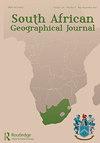A categorization of gated eco-developments in South Africa
IF 1.4
4区 社会学
Q3 GEOGRAPHY
引用次数: 3
Abstract
ABSTRACT Gated communities have evolved into providing unique residential offerings aimed at specific markets. Eco-estates and eco-friendly estates are examples of such niche estates which have witnessed increasing growth in their development throughout South Africa. This paper overviews the literature on the evolution of gated communities and provides a spatial articulation of the location of eco- and eco-friendly estates in South Africa towards creating a categorization of eco-developments. The study is positioned in the theoretical realms of eco-form and eco-urbanism which scaffold the global surge in eco-developments. A database of eco-developments in South Africa was created from several sources and surveys were conducted among developers and estate managers of such developments. The locational analysis shows most eco-developments being located in the Western Cape, Gauteng and KwaZulu-Natal, while more than half of the proposed developments were destined for the remaining provinces. Eco-estates and eco-friendly estates show a predilection for sites on the urban edge, along the coast or with mountain views. Criteria based on eco-practices were selected as standards for a five-category continuum of eco-estates. When applied the categorization confirms that eco-developments display differing levels of eco-ness. While eco-developments do have positive ecological impacts and they do enhance sustainable living, they do not add to social connectivity as they are exclusive ecological islands surrounded by walls.南非封闭式生态发展的分类
封闭式社区已经演变为针对特定市场提供独特的住宅产品。生态庄园和生态友好型庄园是这种小众庄园的例子,它们在整个南非的发展中日益增长。本文概述了有关封闭式社区演变的文献,并提供了南非生态和生态友好型庄园的空间衔接,以创建生态发展的分类。该研究定位于支撑全球生态发展浪潮的生态形态和生态城市主义的理论领域。从几个来源创建了南非生态发展数据库,并对这些发展的开发商和房地产经理进行了调查。位置分析显示,大多数生态开发项目位于西开普省、豪登省和夸祖鲁-纳塔尔省,而超过一半的拟议开发项目将在其余省份进行。生态庄园和生态友好型庄园偏爱城市边缘、沿海或有山景的场地。以生态实践为基础的标准被选为五类生态地产连续体的标准。当应用分类时,证实了生态发展表现出不同程度的生态。虽然生态发展确实具有积极的生态影响,也确实促进了可持续生活,但它们并没有增加社会联系,因为它们是被围墙包围的专属生态岛屿。
本文章由计算机程序翻译,如有差异,请以英文原文为准。
求助全文
约1分钟内获得全文
求助全文
来源期刊

South African Geographical Journal
GEOGRAPHY-
CiteScore
3.40
自引率
7.10%
发文量
25
期刊介绍:
The South African Geographical Journal was founded in 1917 and is the flagship journal of the Society of South African Geographers. The journal aims at using southern Africa as a region from, and through, which to communicate geographic knowledge and to engage with issues and themes relevant to the discipline. The journal is a forum for papers of a high academic quality and welcomes papers dealing with philosophical and methodological issues and topics of an international scope that are significant for the region and the African continent, including: Climate change Environmental studies Development Governance and policy Physical and urban Geography Human Geography Sustainability Tourism GIS and remote sensing
 求助内容:
求助内容: 应助结果提醒方式:
应助结果提醒方式:


